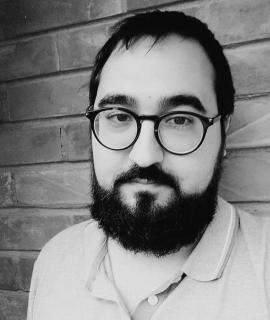
César Aira, the "machine" of Argentine surrealism
With over a hundred novels behind him, not counting translations, the author born in Colonel Pringles is now a well-kept secret of surrealist and avant-garde…
Argentine literature has many edges, one of which is in the form of a Dadaist messiah. Two years ago, a small anomaly happened that went unnoticed when César Aira traveled outside Argentina for a book signing on the day it released. Unfortunately, I was working in another bookstore in the city at the time, so if I escaped to get his signature, I didn't have time to get back to my job.
I was so worried about the lost opportunity that I asked a good friend living with me to take my books to be signed. Everything went wrong that day, but she at least managed to take a picture with him. I printed the improvised portrait and hung it on the fridge, possessed by frustration, screaming to please remember my prophecy about the Argentinean who would one day win the Nobel Prize.
I explain all this because Aira's readers are like a modest cult that whisper their recommendations quietly in the ear of potential acolytes. It is not a super sale, nor is his writing a fantastic saga full of violence and sex, much less cutting-edge journalism. César Aira is something else, he looks more like a surrealist machine or a friend who tells a story before vanishing while looking at the stars.
RELATED CONTENT
Catalan writer Enrique Vila-Matas said this recently while trying to decipher the secret of the prolific author: "It is probable that this fondness for invention machines arose in Aira his hypothesis about the reason for Roussel's writing: The key that unifies all his books is simply the occupation of time. He wrote to fill a vital time in a solid and constant way."
Aira was born in February 1949 in Coronel Pringles, Buenos Aires, a city he has turned into a mythical ground more fertile than Macondo through more than a hundred novels. The same is true of the Flores neighborhood when he moved there and where he now lives. His novels are experiments halfway between avant-garde and surrealism, which avoid the usual requirements of non-fiction to get lost in the infinite game of mirrors the novel allows, and admits even the most flagrant internal contradictions.
That is why it is not surprising that they compare him to a machine or claim he has a workshop of dwarves that compile books. With titles as suggestive as How I Became a Nun, Doctor Aira's Miracle Cures or I Was a Modern Girl, he has shown himself capable of crushing genres as varied as autofiction, soap opera, and superhero, to give them all their own literary essence that becomes nectar for his followers.
His novels can be found in almost every country and are translated into more than fifteen languages, including English. The challenge, of course, is to get them all — something I have not yet contemplated — since he publishes irregularly, but very prolifically in all kinds of publishing houses on both sides of the ocean. An eternal candidate for the Nobel Prize, this year, he published Lugones, his 106th book that recreates the life of the legendary Argentine writer Leopoldo Lugones. Until the definitive fame comes, we will continue whispering his name with the mystery it deserves.












LEAVE A COMMENT: